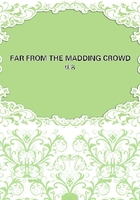
第145章
After the Shock
Boldwood passed into the high road, and turned in the direction of Casterbridge.
Here he walked at an even, steady pace over Yalbury Hill, along the dead level beyond, mounted Mellstock Hill, and between eleven and twelve o'clock crossed the Moor into the town. The streets were nearly deserted now, and the waving lamp-flames only lighted up rows of grey shop-shutters, and strips of white paving upon which his step echoed as he passed along. He turned to the right, and halted before an archway of heavy stonework, which was closed by an iron-studded pair of doors. This was the entrance to the gaol, and over it a lamp was fixed, the light enabling the wretched traveller to find a bell-pull.
The small wicket at last opened, and a porter appeared. Boldwood stepped forward, and said something in a low tone, when, after a delay, another man came. Boldwood entered, and the door was closed behind him, and he walked the world no more.
Long before this time Weatherbury had been thoroughly aroused, and the wild deed which had terminated Boldwood's merrymaking became known to all.
Of those out of the house Oak was one of the first to hear of the catastrophe, and when he entered the room, which was about five minutes after Boldwood's exit, the scene was terrible. All the female guests were huddled aghast against the walls like sheep in a storm, and the men were bewildered as to what to do. As for Bathsheba, she had changed. She was sitting on the floor beside the body of Troy his head pillowed in her lap, where she had herself lifted it. With one hand she held her handkerchief to his breast and covered the wound, though scarcely a single drop of blood had flowed, and with the other she tightly clasped one of his. The household convulsion had made her herself again. The temporary coma had ceased, and activity had come with the necessity for it Deeds of endurance which seem ordinary in philosophy are rare in conduct, and Bathsheba was astonishing all around her now, for her philosophy was her conduct, and she seldom thought practicable what she did not practise. She was of the stuff of which great men's mothers are made. She was indispensable to high generation hated at tea parties, feared in shops, and loved at crises. Troy recumbent in his wife's lap formed now the sole spectacle in the middle of the spacious room.
`Gabriel,' she said, automatically, when he entered, turning up a face of which only the well-known lines remained to tell him it was hers, all else in the picture having faded quite. `Ride to Casterbridge instantly for a surgeon. It is, I believe, useless, but go. Mr Boldwood has shot my husband.'
Her statement of the fact in such quiet and simple words came with more force than a tragic declamation, and had somewhat the effect of setting the distorted images in each mind present into proper focus. Oak, almost before he had comprehended anything beyond the briefest abstract of the event, hurried out of the room, saddled a horse and rode away. Not till he had ridden more than a mile did it occur to him that he would have done better by sending some other man on this errand, remaining himself in the house. What had become of Boldwood? He should have been looked after. Was he mad - had there been a quarrel? Then how had Troy got there? Where had he come from? How did this remarkable reappearance effect itself when he was supposed by many to be at the bottom of the sea? Oak had in some measure been prepared for the presence of Troy by hearing a rumour of his return just before entering Boldwood's house; but before he had weighed that information, this fatal event had been superimposed. However, it was too late now to think of sending another messenger, and he rode on, in the excitement of these self-inquiries not discerning, when about three miles from Casterbridge, a square-figured pedestrian passing along under the dark hedge in the same direction as his own.